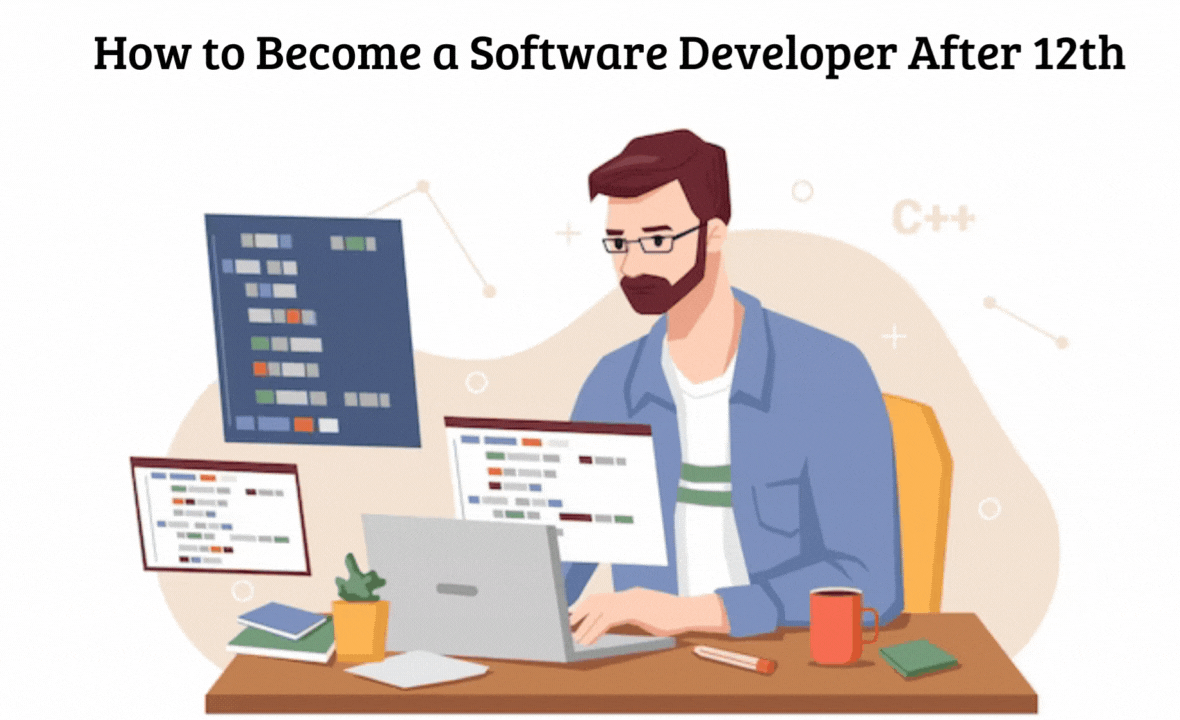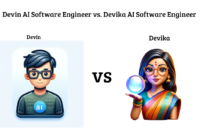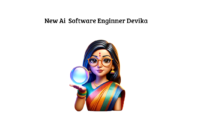How to Become a Software Developer After 12th Software development is a dynamic and rewarding field that plays a pivotal role in shaping our digital world. From mobile applications to web platforms, software developers are the architects behind the technology that drives innovation and progress. If you’re considering a career in software development after completing your 12th grade, you’re on the right path to a promising and fulfilling profession.
Educational Requirements After 12th
Paths to Becoming a Software Developer
After completing your 12th grade, you have several options for pursuing a career in software development. While some individuals opt for traditional college degrees, others choose alternative paths such as coding bootcamps, online courses, or self-study. The key is to choose a path that aligns with your goals, learning style, and resources.
Importance of Higher Education
While a college degree is not always a requirement for becoming a software developer, it can provide valuable knowledge, skills, and credentials that can enhance your career prospects. A degree in computer science, software engineering, or a related field can offer in-depth understanding of programming principles, algorithms, and software development methodologies.
Choosing the Right Degree Program
Computer Science vs. Software Engineering
When selecting a degree program, consider the differences between computer science and software engineering. Computer science focuses on the theoretical aspects of computing, including algorithms, data structures, and computational theory, while software engineering emphasizes the practical application of software development principles and methodologies.
Specializations Within the Field
Within the field of software development, there are various specializations you can pursue based on your interests and career goals. These may include web development, mobile app development, game development, artificial intelligence, cybersecurity, and more. Explore different specialization options to determine which aligns best with your passion and skills.
Learning Programming Languages
Popular Languages for Software Development
Mastering programming languages is essential for success as a software developer. Some of the most popular languages in demand include Java, Python, JavaScript, C++, and Ruby. Each language has its strengths and applications, so it’s beneficial to learn multiple languages to broaden your skill set and adapt to different project requirements.
Resources for Learning Programming
Fortunately, there is a plethora of resources available for learning programming languages, including online courses, tutorials, books, and coding bootcamps. Websites like Codecademy, Udemy, and Coursera offer comprehensive courses taught by industry experts, allowing you to learn at your own pace and convenience.
Building a Strong Foundation
Mastering the Basics of Programming
Before delving into advanced topics, it’s essential to master the basics of programming, including variables, data types, loops, conditionals, and functions. Understanding these fundamental concepts will provide a solid foundation upon which you can build more complex skills and projects.
Developing Problem-Solving Skills
Software development is inherently problem-solving oriented. As a software developer, you’ll encounter various challenges and obstacles that require creative and analytical thinking to overcome. Cultivate your problem-solving skills by tackling coding challenges, participating in hackathons, and seeking out real-world projects to work on.
Gaining Practical Experience
Internships and Projects
Internships provide valuable opportunities to gain hands-on experience in software development and learn from seasoned professionals. Look for internships at tech companies, startups, or software development firms where you can apply your skills in a real-world setting and gain insight into industry practices and workflows.
Contributing to Open-Source Software
Contributing to open-source projects is another excellent way to gain practical experience and demonstrate your skills to potential employers. Open-source projects allow you to collaborate with developers from around the world, work on real-world projects, and make meaningful contributions to the global software development community.
Creating a Portfolio
Showcasing Projects and Achievements
As you gain experience and develop your skills, create a portfolio showcasing your projects, achievements, and contributions. Include descriptions of the projects you’ve worked on, the technologies used, and any notable outcomes or accomplishments. A well-curated portfolio demonstrates your capabilities and can significantly enhance your job prospects.
Building an Online Presence
In addition to a portfolio, establish a professional online presence through platforms like LinkedIn, GitHub, and personal websites. Regularly update your profiles with your latest projects, skills, and experiences to attract potential employers and networking opportunities. Engage with the developer community by sharing insights, participating in discussions, and contributing to open-source projects.
Networking and Collaboration
Joining Developer Communities
Networking with other developers is crucial for career growth and professional development. Join online developer communities, forums, and social media groups to connect with like-minded individuals, seek advice, and share knowledge. Engage in discussions, attend meetups and conferences, and build meaningful relationships with professionals in the industry.
Networking with Professionals
In addition to online communities, attend industry events, job fairs, and networking meetups to expand your professional network. Building relationships with professionals in the field can lead to valuable opportunities, mentorship, and referrals. Don’t hesitate to reach out to industry professionals for advice, guidance, and career opportunities.
Applying for Jobs
Crafting a Compelling Resume
Your resume is your first impression to potential employers, so make it stand out by highlighting your skills, experiences, and achievements relevant to the position. Tailor your resume to each job application, emphasizing your programming languages, projects, internships, and any other relevant experiences that showcase your qualifications for the role.
Preparing for Technical Interviews
Technical interviews are a common part of the job application process for software developers. Prepare for technical interviews by practicing coding exercises, reviewing fundamental concepts, and familiarizing yourself with common interview questions and problem-solving techniques. Demonstrate your problem-solving skills, communication abilities, and coding proficiency during interviews to impress potential employers.
Continuing Education and Career Growth
Pursuing Advanced Degrees or Certifications
Continuing education is essential for staying updated with the latest trends and advancements in software development. Consider pursuing advanced degrees, certifications, or specialized training programs to deepen your knowledge and expertise in specific areas of interest. Lifelong learning is key to maintaining a competitive edge in the ever-evolving field of technology.
Staying Updated with Industry Trends
Stay abreast of industry trends, emerging technologies, and best practices by following industry news, reading blogs, and attending conferences and workshops. Subscribe to newsletters, join online forums, and participate in webinars to stay informed about the latest developments in software development. Continuously expanding your skill set and knowledge base will position you for long-term success and career advancement.
Conclusion
Embarking on a career as a software developer after completing your 12th grade is an exciting and rewarding journey. By pursuing higher education, mastering programming languages, gaining practical experience, and networking with professionals, you can pave the way for a successful and fulfilling career in software development. Remember to stay curious, keep learning, and embrace new opportunities as you progress in your career.
FAQs
- Can I become a software developer without a degree? While a degree can enhance your prospects, it’s possible to become a software developer through self-study, coding bootcamps, and practical experience.
- How long does it take to become a proficient software developer? The time it takes varies depending on individual factors, but consistent practice and dedication can lead to proficiency within a few years.
- What are some essential skills for a software developer? Key skills include programming proficiency, problem-solving abilities, communication skills, and the ability to work well in a team.
- How can I stay motivated while learning programming? Set goals, work on projects that interest you, and seek out support from the developer community to stay motivated and engaged.
- What are the career prospects for software developers? Software development offers a wide range of career opportunities, with demand expected to continue growing as technology evolves. Industries such as healthcare, finance, and cybersecurity offer particularly promising prospects for software developers.





